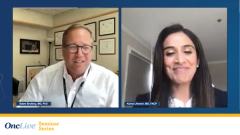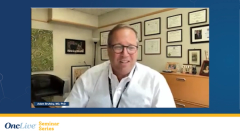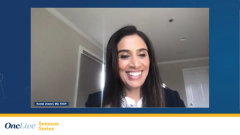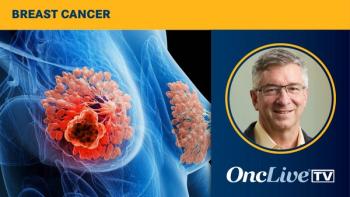
KEYNOTE-522: Neoadjuvant Pembrolizumab + CT Followed by Adjuvant Pembrolizumab in TNBC
Expert perspectives on the KEYNOTE-522 clinical trial, which utilized adjuvant pembrolizumab following neoadjuvant pembrolizumab plus chemotherapy in TNBC.
Transcript:
Adam Brufsky, MD, PhD: Let's move on because we want to do metastatic disease and we're going to miss a lot of the great trials of metastatic disease. But I think, let me just go through [the] KEYNOTE-522 [clinical trial (NCT03036488)], which is the other big study published in [the] New England Journal of Medicine by Peter Schmid [MD, PhD, FRCP at Cancer Research UK Barts Centre], I believe in 2020. And this took women with newly diagnosed triple-negative breast cancer [TNBC] that again were node-positive or a T2 to 4 node-negative with a decent performance status randomized. The typical chemotherapy that we give, which generally it was CarboTaxel [carboplatin plus docetaxel chemotherapy] followed by AC [anthracycline] or EC in the European [study]. Our European colleagues like to use EC. And they were given the standard chemotherapy with, without pembrolizumab, and then post-op, they were given pembrolizumab versus placebo to complete a year of therapy. And obviously in this trial, interestingly enough, regardless of PD-L1 status, the overall pCR [pathological complete response] difference was about 65% vs 51% in this actually. Initially, when this was presented, I remember very distinctly, before [the] ESMO [European Society for Medical Oncology annual meeting], it was presented to the FDA [U.S. Food and Drug Administration] and the 3-year event-free survival, I don't think that was an 18-month event-free survival initially, or it was not statistically significant.
And thus, they wanted to wait for more data, which actually came at the following analysis and showed a substantial benefit. I think it's like 76% vs 84%. And there were many more events at 3 years in the placebo arm than the pembrolizumab arm. And this led to the approval of this drug. Now, Lajos Pusztai [MD, DPhil at Yale University Cancer Center] at this year's ASCO [American Society of Clinical Oncology annual meeting] presented some really interesting data on RCB [residual cancer burden]. I think we're moving toward an RCB, reporting it on pathology reports instead of just pCR or not. And it was interesting. I think the overall benefit was there. The confidence intervals were wide, but it appeared that most people at least as far as plot, there didn't seem, except for RCB-2, to be a difference. But when you look at the absolute benefit in distant recurrence, you really saw that for RCB-0 or 1 there was not a lot of benefit to pembrolizumab, although RCB-0, you could argue that there were some. But most of the benefits came in RCB-2 and even RCB-3. A 3-year distant recurrence rate of 58% vs 35% with relation to pembrolizumab and that's pretty dramatic. And I think that this has really led, I think, to the approval of this drug. I'm assuming you're using this now in everybody getting neoadjuvant therapy.
Komal Jhaveri, MD, FACP: Yes, absolutely—I am. I am utilizing this for most patients, especially nodal positive patients, but also those patients who have T2 tumors and that are node negative—
Adam Brufsky, MD, PhD: Right. And thus, the 2 big questions among many in this are [where] the first one should be really – [is] if someone has a pCR, should we be using the pembrolizumab afterwards, another 6 months? And there's a really interesting trial, I think was called NeoPACT [NCT03639948] . I'm forgetting all [of] these acronyms,[and] I'm forgetting what it was, but this is [by] Priyanka Sharma [,MD, at the University of Kansas Cancer Center], and colleagues [who] presented a really interesting trial of neoadjuvant CarboTaxel or CarboTaxel tier with pembrolizumab and found very high pathologically response rates, but it was only 6 months. They did not get adjuvant pembrolizumab. They all got adjuvant … based therapy, but they found very high pCR rates. That calls into question whether we really should be doing the 6 months or 12 months of pembrolizumab. How are you handling that in patients who have a pCR?
Komal Jhaveri, MD, FACP: Currently, I'm handling that based on what we learned from the KEYNOTE-522, which is where this approval came from. And in that study, patients did get eight cycles of pembrolizumab as neoadjuvant therapy and 9 cycles at the back end in the adjuvant setting. And we did see the event-free survival rates, regardless of the pCR benefits that we saw. In my practice currently, I'm following that, but that's a fantastic research question, which actually our cooperative group trials will be addressing to see, does everybody meet the pembrolizumab at the back end? And who could we peel off that additional pembrolizumab?
Adam Brufsky, MD, PhD: Right. And [concerning] the next question, [which] I think [is] the big one that a lot of people ask and then we'll move on to metastatic disease. The other one is if someone comes in with BRCA-associated tumor in the adjuvant setting, what do you do? Do you give them pembrolizumab? Do you give them Olaparib, or do you give them both? And in various ad boards and talking to my colleagues, I've had everything across the board. Pembrolizumab single agent, olaparib single agent, or combination. How are you handling that right now?
Komal Jhaveri, MD, FACP: If one had to be a purist in the KEYNOTE-522 specifically, we did not see the studying of the combination. And we did not necessarily see BRCA mutant getting the combination. Having said that, we have a lot of safety data and efficacy data, I think outside of the KEYNOTE-522, where we've tried to study a combination of a PARP inhibitor with an IO [immunooncology] agent. And thus, for my patients, I think I would be very tempted to do that. Assuming that there are no issues from the peers that I would offer them the KEYNOTE-522 regimen and in the adjuvant-setting would try and offer them the adjuvant Olaparib data and then continue the pembrolizumab.
Adam Brufsky, MD, PhD: Got it. With that, we'll move on. We want to leave some issues for questions. See, the problem is that when you get two academic oncologists together, we can talk for hours about this.
Transcript edited for clarity.







































